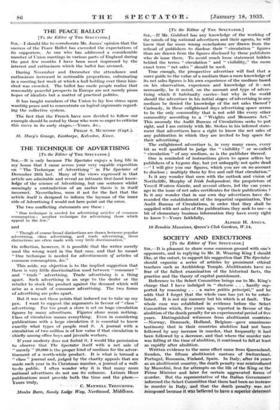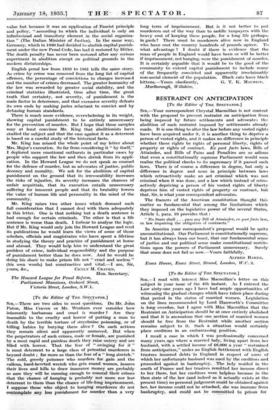SOCIETY AND EXECUTIONS
[To the Editor of THE SPECTATOR.] SIR,—It is pleasant to share some common ground with one's opponents, and in replying to Mr. R. Wearing King I should like, at the outset, to support his suggestion that The Spectator should organile a series of articles by prominent ethical teachers such as Archbishop Temple. Abolitionists have no fear of the fullest examination of the historical facts, the practice and the theory of capital punishment.
Reference to the Select Committee brings me to Mr. King's charge that I have indulged in " rhetoric . . . hardly sup- ported by reasoning . . . a naive petitio principii," and he adds that I forget that the whole case has yet to be estab- lished. It is not in'y memory but his which is at fault. The whole case was established in evidence before the Select Committee which, five years ago, reported in favour of the abolition of the death penalty for an experimental period of five years. Distinguished witnesses from abolitionist countries —Norway, Denmark, Holland, Belgium—gave unanimous testimony that in their countries abolition had not been followed by any increase in murder,- that frequently it had been followed by a decrease; and that where the murder rate was falling at the time of abolition, it continued to fall at least as rapidly after abolition.
Written evidence to the same effect came from Queensland, Sweden, the fifteen abolitionist cantons of Switzerland, Portugal, Rumania, Finland, Spain. In Italy, after 54 years as an abolitionist country, the death penalty was reintroduced by Mussolini, first for attempts on the life of the King or the Prime Minister and later for certain aggravated forms of murder. But the representative of the Italian Government firforrned the Select Committee that there had been no increase ''in murder in Italy, and that the death penalty was not reimposed because it was believed to have a superior deterrent value but because it was an application of Fascist principle and policy, ":according: to which the individual is only an infinitesimal and transitory element in the social organiza- tion " (The. Italian Minister of Justice). In the same way, Germany, which in 1930 had decided to abolish capital punish- ment under the new Penal Code, has had it restored by Hitler. The death penalty has never been restored after any serious experiment in abolition except on political grounds in the modern dictatorships.
English penal law from 1810 to 1861 tells the same story. As crime by crime was removed from the long list of capital offences, the percentage of convictions to charges increased and the number of crimes decreased. The greater humanity of the law was rewarded by greater social stability, and the criminal statistics illustrated, time after time, the great truth that certainty, not severity, of punishment is the main factor in deterrence, and that excessive severity defeats its own ends by making juries reluctant to convict and by debasing human standards.
There is much more evidence, overwhelming in its weight, showing capital punishment to be entirely unnecessary for the prevention of murder. But I hope that these samples may at least convince Mr. King that abolitionists have studied the subject and that the case against it as a deterrent is based on a careful study of the historical facts.
Mr. King has missed the whole point of my letter about Mrs. Major's execution. So far from considering it " by itself," I deplored mere emotional outbursts in particular cases .by people who support the law and then shrink from its appli- cation. In the Howard League we do not speak as counsel for the defence of murder, but as advocates of justice, public decency and morality. We ask for the abolition of capital punishment on the ground that its irrevocability increases the risks of injustice, its severity increases the chances of unfair acquittals, that its execution entails unnecessary suffering for innocent people and that its brutality lowers the value of human life and personality in the mind of the community.
Mr. King raises two other issues which demand such full consideration that I cannot deal with them adequately in this letter. One is that nothing but a death sentence' is bad enough for certain criminals. The other is that a life sentence is worse than death. I forbear to analyse the logic. But if Mr. King would only join the Howard League and road its publications he would learn the views of some of those scholars, officials and magistrates who have spent a lifetime in studying the theory and practice of punishment at home and abroad. They would help him to understand the great problem of crime, individual responsibility and the purpose of punishment better than he does now. And he would be doing his share to make prison life not " cruel and useless " (his own words) but constructive and vital.—I am, Sir,
- Hon. Secretary: The Howard League for Penal Reform, Parlianient Mansions, Orchard Street, Victoria Street, London, S.147.1.







































 Previous page
Previous page